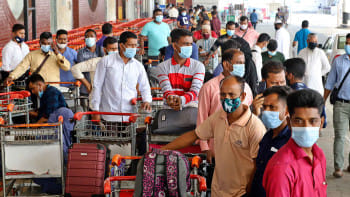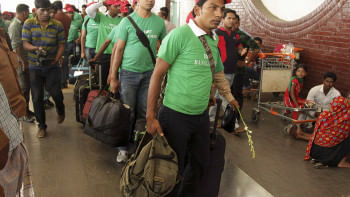New Malaysian PM could mean good news for Bangladeshi workers

With the ascension of Anwar Ibrahim as the prime minister of Malaysia, after 24 years of battling forces in Malaysian politics that were hellbent on depriving him of this moment, there appears to be a wind of change in the country.
No one knows how much this will impact current bilateral and trade ties between Kuala Lumpur and Dhaka, which have not been that great but fairly acceptable so far. Bangladesh will celebrate its 52nd year as an independent nation this year, meaning Dhaka has remained an all-weather friend and ally to Kuala Lumpur for almost half a century. This year will also mark 51 years of diplomatic relations between the two countries, since Malaysia recognised Bangladesh as a sovereign nation in 1972.
However, these are all seen on the glossy surface while deep inside, the protection of Bangladeshi workers in Malaysia has been a nagging concern of international human rights watchdogs.
Right now, the newly minted Malaysian prime minister is focusing on ties with his immediate neighbours. Anwar flew to Jakarta last week on his first official visit abroad, and he is scheduled to visit Singapore and Brunei at the end of this month.
His strong statement in Jakarta could be an indicator of how the largest issue between Malaysia and Bangladesh – euphemistically called labour mobility – is going to pan out. He announced that Malaysia and Indonesia have both agreed to further strengthen the protection of migrant workers, who number more than a million at the moment.
Admitting that there were some issues that have hurt the feelings of the Indonesian people as well as their government, he said the solution must be more comprehensive so that workers will be protected.
Anwar added that both sides would ensure that employment agencies do not make a high profit by exploiting migrant workers. Now, this is indeed a very serious issue affecting workers from Bangladesh, with lots of abuses involving agents in both countries.
The hurt feelings he spoke about are an open secret. Serious abuses of domestic workers in the past in Malaysia, though not rampant, had been the bane of the ties between the two neighbours. In addition, cases of non-payment of wages have compounded the problem.
Now that Anwar seems to be prioritising this human aspect by making it his first announcement, Bangladesh too should visit him or invite him to Dhaka, since among the estimated four million foreign workers in Malaysia, a quarter or more of them are Bangladeshis.
It is obviously time to revisit the five-year Memorandum of Understanding (MoU) on the intake of foreign workers that was signed by the two countries in 2021 to improve protection.
Unfortunately, we have heard of far too many setbacks involving Bangladeshi workers in Malaysia. These include poor working conditions, unacceptable living environments, non-payment of wages and being treated without dignity. According to the definition of the International Labour Organisation, the companies involved with these are guilty of forced labour.
There were cases of many Bangladeshis who reach Malaysian shores by using their hard-earned savings and even mortgaging their properties, with high hopes of returning with better fortunes. Some of them then ended up as victims of human trafficking syndicates and unscrupulous recruitment agents.
There have been positive changes in this area over the last several years, thanks to international human rights group and activists exposing many employers, including multibillion-dollar companies, which led to the US Customs Border Protection Agency to ban products from some of these firms.
This resulted in a number of them rectifying their mistakes and treating Bangladeshi and other foreign workers with a semblance of dignity. These firms were them taken off the list, although a few recalcitrant ones are still on the blacklist.
However, both countries need to do more. An international watchdog has claimed, as recently as a few weeks ago, that the inflow of foreign workers from Bangladesh to Malaysia is still being monopolised by two power brokers. This is despite the MoU that gave permission to 25 agencies to recruit workers.
Calls are growing for a system that no longer limits the number of recruitment agencies and ends the involvement of the two "cartels" that rake in billions annually from forced labour and exploitation. There are also allegations of human trafficking syndicates that cause the misery of thousands of Bangladeshi migrants, as well as of corruption in the recruitment system that has lined the pockets of government officials of both countries.
Hence, it is of utmost importance that Bangladesh plays its role as a responsible source country by preventing its agencies from exploiting their citizens even before they leave for Malaysia. The blood, sweat and toil, in addition to their sacrifices of being oceans away from their loved ones, should not be in vain. They must be protected.
With Anwar's announced stand on inhumane treatment and abuse of foreign workers, it would be timely for the Bangladeshi government to capitalise on this, and his intent to protect its citizens working in Malaysia for a meagre monthly salary of RM1,500.
But it has to be a two-way action. Both Malaysia and Bangladesh need to jointly tackle this issue to weed out the flesh trade, so to speak.
K Parkaran is a freelance journalist in Kuala Lumpur, and currently a columnist with Malaysia's leading news portal FreeMalaysiaToday (FMT).

 For all latest news, follow The Daily Star's Google News channel.
For all latest news, follow The Daily Star's Google News channel. 





Comments